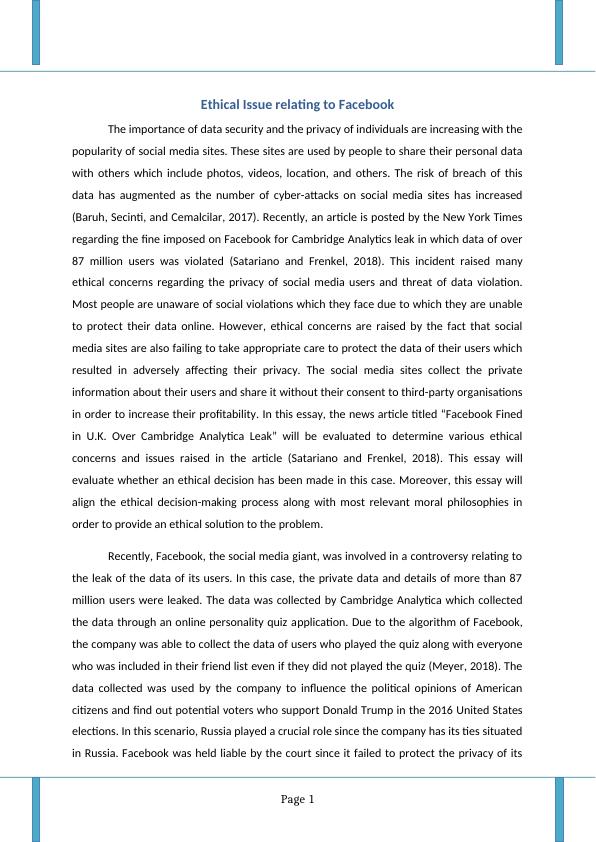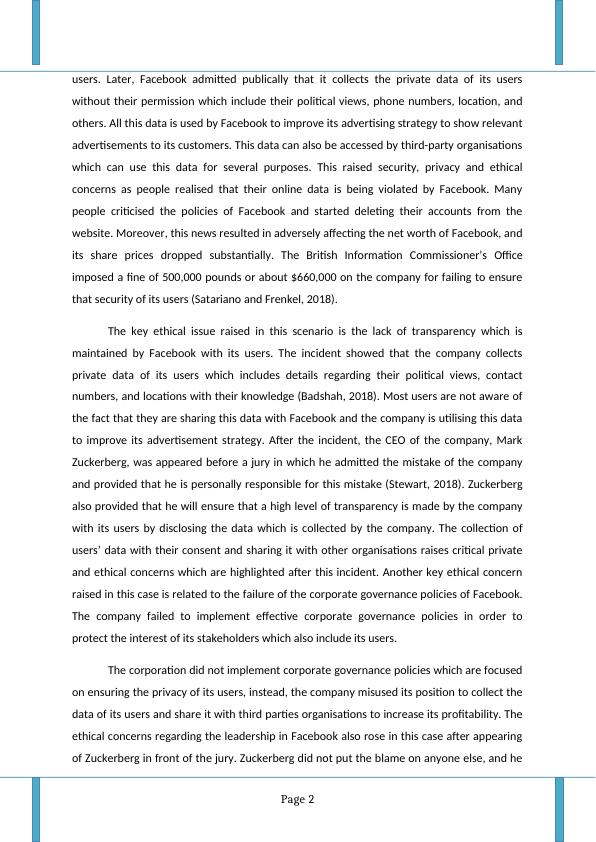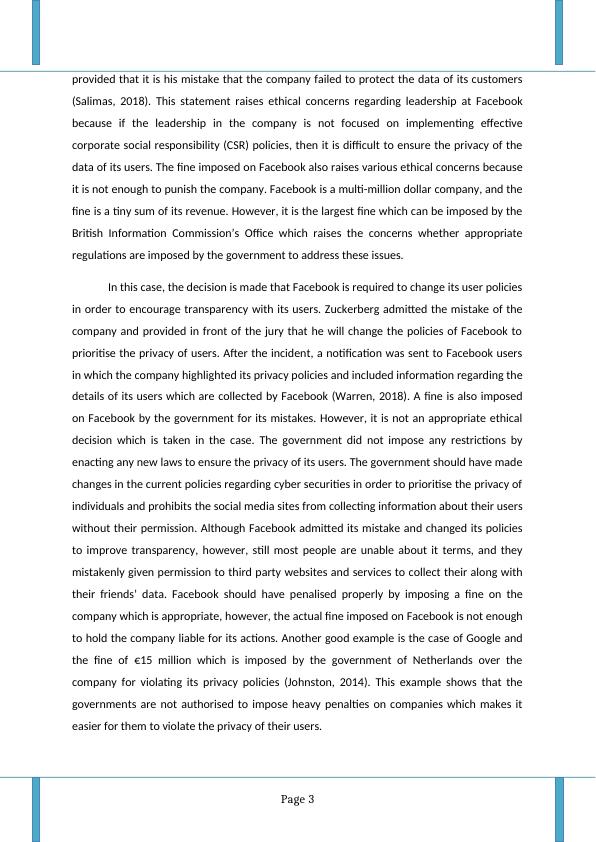Ethical Issue relating to Facebook
Added on 2023-06-05
13 Pages2642 Words470 Views
Comparative Business Ethics and Social Responsibility

Ethical Issue relating to Facebook
The importance of data security and the privacy of individuals are increasing with the
popularity of social media sites. These sites are used by people to share their personal data
with others which include photos, videos, location, and others. The risk of breach of this
data has augmented as the number of cyber-attacks on social media sites has increased
(Baruh, Secinti, and Cemalcilar, 2017). Recently, an article is posted by the New York Times
regarding the fine imposed on Facebook for Cambridge Analytics leak in which data of over
87 million users was violated (Satariano and Frenkel, 2018). This incident raised many
ethical concerns regarding the privacy of social media users and threat of data violation.
Most people are unaware of social violations which they face due to which they are unable
to protect their data online. However, ethical concerns are raised by the fact that social
media sites are also failing to take appropriate care to protect the data of their users which
resulted in adversely affecting their privacy. The social media sites collect the private
information about their users and share it without their consent to third-party organisations
in order to increase their profitability. In this essay, the news article titled “Facebook Fined
in U.K. Over Cambridge Analytica Leak” will be evaluated to determine various ethical
concerns and issues raised in the article (Satariano and Frenkel, 2018). This essay will
evaluate whether an ethical decision has been made in this case. Moreover, this essay will
align the ethical decision-making process along with most relevant moral philosophies in
order to provide an ethical solution to the problem.
Recently, Facebook, the social media giant, was involved in a controversy relating to
the leak of the data of its users. In this case, the private data and details of more than 87
million users were leaked. The data was collected by Cambridge Analytica which collected
the data through an online personality quiz application. Due to the algorithm of Facebook,
the company was able to collect the data of users who played the quiz along with everyone
who was included in their friend list even if they did not played the quiz (Meyer, 2018). The
data collected was used by the company to influence the political opinions of American
citizens and find out potential voters who support Donald Trump in the 2016 United States
elections. In this scenario, Russia played a crucial role since the company has its ties situated
in Russia. Facebook was held liable by the court since it failed to protect the privacy of its
Page 1
The importance of data security and the privacy of individuals are increasing with the
popularity of social media sites. These sites are used by people to share their personal data
with others which include photos, videos, location, and others. The risk of breach of this
data has augmented as the number of cyber-attacks on social media sites has increased
(Baruh, Secinti, and Cemalcilar, 2017). Recently, an article is posted by the New York Times
regarding the fine imposed on Facebook for Cambridge Analytics leak in which data of over
87 million users was violated (Satariano and Frenkel, 2018). This incident raised many
ethical concerns regarding the privacy of social media users and threat of data violation.
Most people are unaware of social violations which they face due to which they are unable
to protect their data online. However, ethical concerns are raised by the fact that social
media sites are also failing to take appropriate care to protect the data of their users which
resulted in adversely affecting their privacy. The social media sites collect the private
information about their users and share it without their consent to third-party organisations
in order to increase their profitability. In this essay, the news article titled “Facebook Fined
in U.K. Over Cambridge Analytica Leak” will be evaluated to determine various ethical
concerns and issues raised in the article (Satariano and Frenkel, 2018). This essay will
evaluate whether an ethical decision has been made in this case. Moreover, this essay will
align the ethical decision-making process along with most relevant moral philosophies in
order to provide an ethical solution to the problem.
Recently, Facebook, the social media giant, was involved in a controversy relating to
the leak of the data of its users. In this case, the private data and details of more than 87
million users were leaked. The data was collected by Cambridge Analytica which collected
the data through an online personality quiz application. Due to the algorithm of Facebook,
the company was able to collect the data of users who played the quiz along with everyone
who was included in their friend list even if they did not played the quiz (Meyer, 2018). The
data collected was used by the company to influence the political opinions of American
citizens and find out potential voters who support Donald Trump in the 2016 United States
elections. In this scenario, Russia played a crucial role since the company has its ties situated
in Russia. Facebook was held liable by the court since it failed to protect the privacy of its
Page 1

users. Later, Facebook admitted publically that it collects the private data of its users
without their permission which include their political views, phone numbers, location, and
others. All this data is used by Facebook to improve its advertising strategy to show relevant
advertisements to its customers. This data can also be accessed by third-party organisations
which can use this data for several purposes. This raised security, privacy and ethical
concerns as people realised that their online data is being violated by Facebook. Many
people criticised the policies of Facebook and started deleting their accounts from the
website. Moreover, this news resulted in adversely affecting the net worth of Facebook, and
its share prices dropped substantially. The British Information Commissioner’s Office
imposed a fine of 500,000 pounds or about $660,000 on the company for failing to ensure
that security of its users (Satariano and Frenkel, 2018).
The key ethical issue raised in this scenario is the lack of transparency which is
maintained by Facebook with its users. The incident showed that the company collects
private data of its users which includes details regarding their political views, contact
numbers, and locations with their knowledge (Badshah, 2018). Most users are not aware of
the fact that they are sharing this data with Facebook and the company is utilising this data
to improve its advertisement strategy. After the incident, the CEO of the company, Mark
Zuckerberg, was appeared before a jury in which he admitted the mistake of the company
and provided that he is personally responsible for this mistake (Stewart, 2018). Zuckerberg
also provided that he will ensure that a high level of transparency is made by the company
with its users by disclosing the data which is collected by the company. The collection of
users’ data with their consent and sharing it with other organisations raises critical private
and ethical concerns which are highlighted after this incident. Another key ethical concern
raised in this case is related to the failure of the corporate governance policies of Facebook.
The company failed to implement effective corporate governance policies in order to
protect the interest of its stakeholders which also include its users.
The corporation did not implement corporate governance policies which are focused
on ensuring the privacy of its users, instead, the company misused its position to collect the
data of its users and share it with third parties organisations to increase its profitability. The
ethical concerns regarding the leadership in Facebook also rose in this case after appearing
of Zuckerberg in front of the jury. Zuckerberg did not put the blame on anyone else, and he
Page 2
without their permission which include their political views, phone numbers, location, and
others. All this data is used by Facebook to improve its advertising strategy to show relevant
advertisements to its customers. This data can also be accessed by third-party organisations
which can use this data for several purposes. This raised security, privacy and ethical
concerns as people realised that their online data is being violated by Facebook. Many
people criticised the policies of Facebook and started deleting their accounts from the
website. Moreover, this news resulted in adversely affecting the net worth of Facebook, and
its share prices dropped substantially. The British Information Commissioner’s Office
imposed a fine of 500,000 pounds or about $660,000 on the company for failing to ensure
that security of its users (Satariano and Frenkel, 2018).
The key ethical issue raised in this scenario is the lack of transparency which is
maintained by Facebook with its users. The incident showed that the company collects
private data of its users which includes details regarding their political views, contact
numbers, and locations with their knowledge (Badshah, 2018). Most users are not aware of
the fact that they are sharing this data with Facebook and the company is utilising this data
to improve its advertisement strategy. After the incident, the CEO of the company, Mark
Zuckerberg, was appeared before a jury in which he admitted the mistake of the company
and provided that he is personally responsible for this mistake (Stewart, 2018). Zuckerberg
also provided that he will ensure that a high level of transparency is made by the company
with its users by disclosing the data which is collected by the company. The collection of
users’ data with their consent and sharing it with other organisations raises critical private
and ethical concerns which are highlighted after this incident. Another key ethical concern
raised in this case is related to the failure of the corporate governance policies of Facebook.
The company failed to implement effective corporate governance policies in order to
protect the interest of its stakeholders which also include its users.
The corporation did not implement corporate governance policies which are focused
on ensuring the privacy of its users, instead, the company misused its position to collect the
data of its users and share it with third parties organisations to increase its profitability. The
ethical concerns regarding the leadership in Facebook also rose in this case after appearing
of Zuckerberg in front of the jury. Zuckerberg did not put the blame on anyone else, and he
Page 2

provided that it is his mistake that the company failed to protect the data of its customers
(Salimas, 2018). This statement raises ethical concerns regarding leadership at Facebook
because if the leadership in the company is not focused on implementing effective
corporate social responsibility (CSR) policies, then it is difficult to ensure the privacy of the
data of its users. The fine imposed on Facebook also raises various ethical concerns because
it is not enough to punish the company. Facebook is a multi-million dollar company, and the
fine is a tiny sum of its revenue. However, it is the largest fine which can be imposed by the
British Information Commission’s Office which raises the concerns whether appropriate
regulations are imposed by the government to address these issues.
In this case, the decision is made that Facebook is required to change its user policies
in order to encourage transparency with its users. Zuckerberg admitted the mistake of the
company and provided in front of the jury that he will change the policies of Facebook to
prioritise the privacy of users. After the incident, a notification was sent to Facebook users
in which the company highlighted its privacy policies and included information regarding the
details of its users which are collected by Facebook (Warren, 2018). A fine is also imposed
on Facebook by the government for its mistakes. However, it is not an appropriate ethical
decision which is taken in the case. The government did not impose any restrictions by
enacting any new laws to ensure the privacy of its users. The government should have made
changes in the current policies regarding cyber securities in order to prioritise the privacy of
individuals and prohibits the social media sites from collecting information about their users
without their permission. Although Facebook admitted its mistake and changed its policies
to improve transparency, however, still most people are unable about it terms, and they
mistakenly given permission to third party websites and services to collect their along with
their friends’ data. Facebook should have penalised properly by imposing a fine on the
company which is appropriate, however, the actual fine imposed on Facebook is not enough
to hold the company liable for its actions. Another good example is the case of Google and
the fine of €15 million which is imposed by the government of Netherlands over the
company for violating its privacy policies (Johnston, 2014). This example shows that the
governments are not authorised to impose heavy penalties on companies which makes it
easier for them to violate the privacy of their users.
Page 3
(Salimas, 2018). This statement raises ethical concerns regarding leadership at Facebook
because if the leadership in the company is not focused on implementing effective
corporate social responsibility (CSR) policies, then it is difficult to ensure the privacy of the
data of its users. The fine imposed on Facebook also raises various ethical concerns because
it is not enough to punish the company. Facebook is a multi-million dollar company, and the
fine is a tiny sum of its revenue. However, it is the largest fine which can be imposed by the
British Information Commission’s Office which raises the concerns whether appropriate
regulations are imposed by the government to address these issues.
In this case, the decision is made that Facebook is required to change its user policies
in order to encourage transparency with its users. Zuckerberg admitted the mistake of the
company and provided in front of the jury that he will change the policies of Facebook to
prioritise the privacy of users. After the incident, a notification was sent to Facebook users
in which the company highlighted its privacy policies and included information regarding the
details of its users which are collected by Facebook (Warren, 2018). A fine is also imposed
on Facebook by the government for its mistakes. However, it is not an appropriate ethical
decision which is taken in the case. The government did not impose any restrictions by
enacting any new laws to ensure the privacy of its users. The government should have made
changes in the current policies regarding cyber securities in order to prioritise the privacy of
individuals and prohibits the social media sites from collecting information about their users
without their permission. Although Facebook admitted its mistake and changed its policies
to improve transparency, however, still most people are unable about it terms, and they
mistakenly given permission to third party websites and services to collect their along with
their friends’ data. Facebook should have penalised properly by imposing a fine on the
company which is appropriate, however, the actual fine imposed on Facebook is not enough
to hold the company liable for its actions. Another good example is the case of Google and
the fine of €15 million which is imposed by the government of Netherlands over the
company for violating its privacy policies (Johnston, 2014). This example shows that the
governments are not authorised to impose heavy penalties on companies which makes it
easier for them to violate the privacy of their users.
Page 3

End of preview
Want to access all the pages? Upload your documents or become a member.
Related Documents
Data violation of Facebook Users - Comparative Business Ethics & Social Responsibilitylg...
|9
|1493
|181
Facebook Sued Over Cambridge Analytica Data Leak: An Ethical Analysislg...
|11
|2664
|314
Corporate Social Responsibility Issues Raised by Cambridge Analytica Scandal at Facebooklg...
|14
|4250
|281
BUSI 1475 : Management in Critical Contextlg...
|13
|3796
|102
Facebook Data Mining Scandal: An Ethical Perspectivelg...
|12
|2573
|430
Professional Practice and Ethicslg...
|10
|2157
|35
